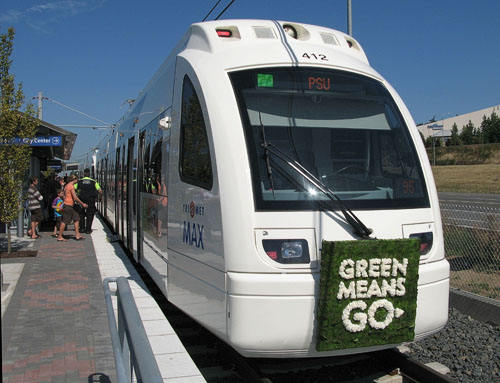By now I think it’s safe to say that nearly every Portland State student knows the school’s stance on sustainability. Portland is one of the greenest cities in the country, so it makes sense that the state’s largest public university values green living as well.
Green Eyez

By now I think it’s safe to say that nearly every Portland State student knows the school’s stance on sustainability. Portland is one of the greenest cities in the country, so it makes sense that the state’s largest public university values green living as well.
I recently found out that PSU has this thing called an Urban Sustainability Accelerator. I had no idea what that was even though this is my third year in school. I figure a lot of other people outside of the engineering, sustainability and community development programs probably don’t know what it is either.
Because the word “accelerator” is in the title, I figured it was some kind of new-age device—but I was wrong. The USA (a perfect acronym) helps implement sustainability and provides assistance and peer-to-peer advising. Perhaps most importantly, it includes project members and the community in the cultivation of sustainability.
The main point of the project is to aid smaller cities in creating sustainable development and cultivating a green lifestyle for future generations. Beginning just this year, the project is set to last for one calendar year and will continue beyond that if resources allow. Cities were selected based on their desire to participate and willingness to “advance plans and policies related to sustainability in their own regions,” according to a PSU press release.
The first batch of participants includes cities in Texas, Kansas, Maine, Kentucky and California. There’s a reason PSU’s motto is “Let knowledge serve the city.” Part of the responsibility of having that knowledge and these wonderful resources is knowing when to share.
“Over the last 40 years, people in our region—at PSU, in government, [in] the private sector, nonprofit organizations and community leaders—have acquired valuable expertise in many sustainability subjects,” USA Director Robert Liberty said. “As other cities aspire to greater sustainability they can both draw upon that expertise and, through our collaboration with them, contribute to that store of knowledge.”
It’s kind of like that quote from Spider-Man’s Uncle Ben: “With great power comes great responsibility.” Since PSU is such a sustainable powerhouse, it makes sense that we feel the need to share our wealth of knowledge with communities that haven’t made the “top green cities” lists.
So now that we know how green and generous with its knowledge PSU is, what makes this project different from anything else that’s been done?
The USA focuses on implementation. What this means is that rather than just talking about how nice it would be if everyone had the same green, sustainable lifestyles as people in Portland, the USA actually goes in and implements these changes in participating cities.
The program also includes assistance for the duration of the yearlong timeline; then, if there are still resources available, it will continue to provide assistance.
Another important part of the project is mutual learning and advising. Both parties benefit from the shared resources and knowledge. This allows for a broader spectrum of sustainability efforts to be cultivated.
According to the International City/County Management Association, an organization that works with local government to promote sustainability, some of the other goals of the project are: “creating active transportation networks” and “multi-modal and mixed use corridors,” and integrating “land use and transportation planning at the project and system level in order to promote sustainable communities and reduce climate-changing pollution.”
In addition, the project will play a large role in urban development, waste reduction and protecting natural environments, when necessary.
This is a really wonderful way for Portland to extend its resources, knowledge and sustainable ways to other cities. Like I always say when I write articles like this, part of sustainable living is fostering and providing aid to smaller communities. If this project can help do that, then it’s something worth knowing about.
Projects like this are doing things that can really benefit the community, and I don’t see any negative aspects to this apart from the possibility of the efforts going to waste after the initial year is up.
And all that’s necessary to avoid that is, as always, sustainable thinking and community building from the get-go. With all of these things happening and working together, Portland can be a national leader in sustainability. That’s pretty cool.






